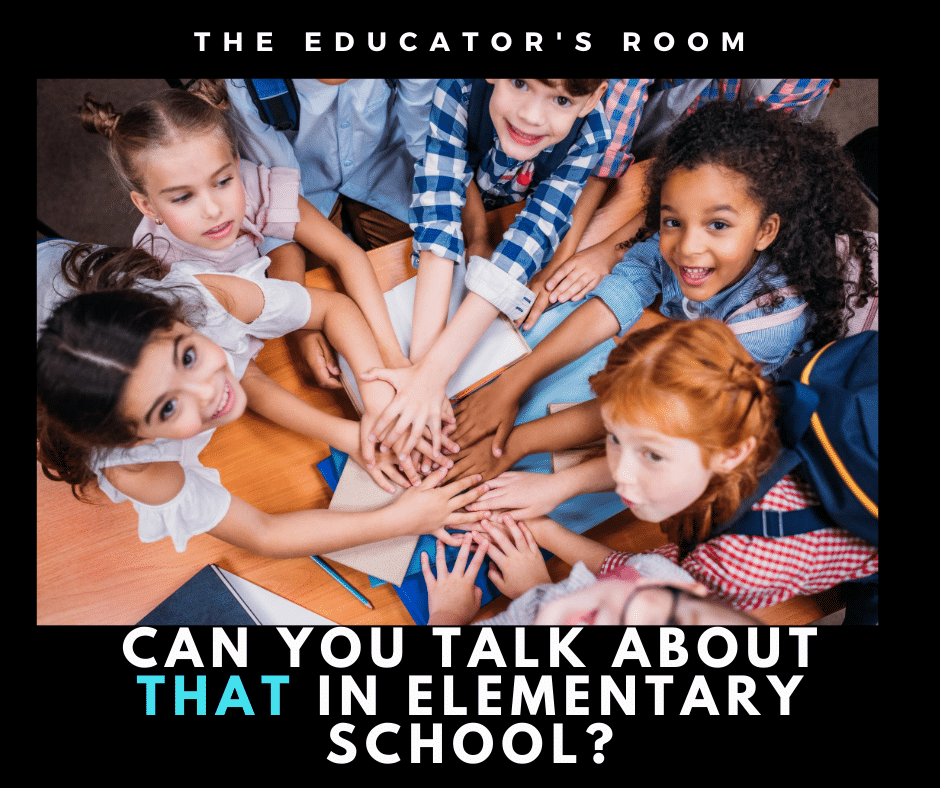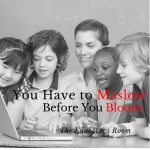By: Dr. Rachael Mahmood
“Can you really talk about that in elementary school?” My colleagues often ask me. Then think for a moment and confirm, “I don’t think you can!”
As an elementary school teacher, I often feel the need to close the door when talking to students about sensitive social justice topics like race, privilege, Black Lives Matter, gay rights, and police brutality.
Why is it that our school districts can make sweeping comments about their support of equity and the need to talk about racism in schools, and yet, the very teachers who must carry out these visions, feel that they don’t have the permission to go there? Why is it that we feel the need to close our doors?
As an elementary school teacher and an equity ambassador for my school district, I too even feel the anxiety when discussing sensitive social justice topics. However, I push through because I understand the value of these conversations and am confident that these discussions must take place even with our youngest students.
I know that many of my colleagues want to have these important conversations with their students, and they too value the importance, however, in the end, decide not to go there, out of fear of getting in trouble. Oftentimes, even if they are willing to confront their anxiety to do so, they don’t just simply don’t know where to start.
[bctt tweet=”Teaching for Black lives and being a social justice-focused educator means that we must weave these social justice topics through all our curriculum” username=””]
Teaching for Black lives and being a social justice-focused educator means that we must weave these social justice topics through all our curriculum: Language arts, math, science, social studies, and so forth.
There are four simple steps that a teacher can take to bend any lesson towards being socially just: Inspect, Reflect, Correct, and Connect.
Using these steps, educators can easily integrate the critical thinking skills necessary to help students identify, understand, and confront topics like white supremacy, racism, and gender identity.
Inspect
When beginning a lesson or before reading a book. I always start with some discussion over the anchor text of that topic. I show the students the cover of a book or the pictures of a topic and I ask them a series of questions that help them to inspect directly what they see.
Some of these questions might be: What do you notice about the people/ characters? What do you notice about their skin color? What do you notice about their gender? What do you notice about their setting? Whose point of view is this story/ topic told from? Whose story is included in this lesson? This can even be done in math, what do you notice about the genders/ races of the people on the coins or bills?
During this time, I also help students to build vocabulary necessary for them to talk about identity. For example, students unpack words like gender, race, religion. Knowing these words helps them to feel comfortable speaking explicitly about parts of identities often hushed in classrooms. For example, we can’t overcome racism if students don’t understand race.
Reflect
After leading the students through a series of questions about what they can see, I begin to shift my questioning to things that they cannot see. With this next set of questions, I ask students to reflect on what is missing.
Whose story is missing? Who is not represented? How do they know that is the gender of the characters? What defines gender? Which perspective is not included? Why do you think those perspectives were excluded from this story/topic? How might people feel about the exclusion of these perspectives?
While I ask these reflective questions to students, I begin to introduce social justice vocabulary, such as; racism, sexism, xenophobia, white privilege. If we expect students to be cognizant of social justice topics and be able to discuss them, then they need the necessary vocabulary to have those conversations and to call out those injustices that they witness.
Correct
After reading the text or going through the main subject of the assigned curriculum, I begin to introduce ideas, conversations, and materials to correct the injustices that the curriculum presented. For example, when teaching about Apollo 11, I introduce African American and/or women astronauts. I ask students where we can find the feelings and perspectives of the missing or marginalized groups. When teaching about Native Americans, I present texts like Encounter which show their perspectives of colonization and read articles written by Native Americans of their views of Thanksgiving. Correcting can be as simple as having an explicit conversation about the bias presented in the book/topic and talking about why or how that is hurtful to groups of people.
Connect
Finally, I help students to make connections between the injustice that they read about in the book or the topic, to modern-day injustices. I ask my students, does this type of social injustice exist today? Does this remind you of anything that you have seen on tv or heard people talking about?
This is an opportune time to connect Native American history with the cultural appropriation of mascots, to talk about the civil rights movement of the 60s with the Black Lives Matter movements of today, and to link topics of Ellis Island and Colonization to DACA and Dreamers.
During these conversations, students often get excited to share about their connections and start to naturally generate ideas of what they could do to fight these current injustices.
As elementary school teachers, we often feel that we need permission to talk about the tough topics with our students. We are told, “they are too young to understand, or you will get in trouble if you go there,” even while school districts are pushing equity agendas harder than ever before.
But if we don’t go there, we will continue to raise students who already know by kindergarten not to talk about race or mention the skin color of a character. We will continue to raise students that don’t have the vocabulary to speak about the injustice they see, let alone call it out or confront it. We will continue to raise children who perpetuate misconceptions and white supremacist versions of history.
So, we must go there. We must have these conversations with children so that they can grow up to confidently speak about the complexities of our identities, call out the injustices they see, correct the misconceptions and biases that they are fed, and finally make connections to modern injustices that they can grow up to fight.
So, open your door teacher! You have permission to raise a better future generation.
**Bio
Dr. Rachael Mahmood is a fifth-grade teacher in a large school district outside of Chicago. In addition to teaching, she works as an equity ambassador designing and delivering equity workshops throughout her school district as well as in surrounding schools. Rachael shares ideas, lessons, and frameworks for culturally responsive teaching with other educators on her website http://equityteacherleader.com, her youtube channel https://tinyurl.com/serve-verve-observe. Her doctoral research re-examined parent involvement models to credit the involvement of African American mothers with low incomes. In January 2020, she was featured in the Chicago Tribune: Naperville Sun paper, and recognized as a semi-finalist for the Teaching Tolerance Award for Teaching Excellence.






